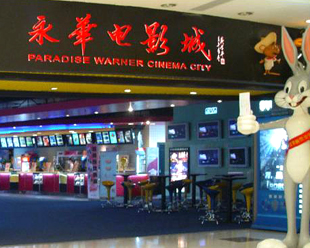| Home / Entertainment / News | Tools: Save | Print | E-mail | Most Read |
| Warner Bros. Pulling Out from China's Cinema Business |
| Adjust font size: |
World movie giant Warner Bros. has decided to withdraw its investment in China's cinema market due to regulatory changes, a publicist confirmed today.
Shanghai Paradise Warner Cinema City, the nation's most profitable cinema for the last three years, is a joint venture between Warner Bros. International Cinemas (WBIC) and Shanghai Film Group Corporation (SFGC). However, WB has decided to pull out despite promising revenues. This decision will affect other five joint-venture Warner Bros. cinemas in Nanjing, Guangzhou, Chongqing, Changsha and Nanchang. Three major cooperating partners, SFGC, Guangzhou Jinyi International Cinemas Co.,Ltd. and Shenzhen International Trust & Investment Co., Ltd., will also be affected. The references to Warner Bros. will vanish from cinemas' brand names. All cinemas under Warner Bros. International Cinemas' name have jointly raked in over 120 million yuan (US$15.2 million) in 2005. Warner Bros. was the first foreign media company to invest its expertise and capital into the Chinese cinema industry through its business unit Warner Bros. International Cinemas in 2002. Shanghai Paradise Warner Cinema City was built soon after with Warner Bros. holding 49 percent of its total shares, paving the way for an investing frenzy with other foreign companies deciding to invest in the Chinese cinema industry. In September 2003, the State Administration of Radio, Film and Television released Temporary Regulation on Foreign Enterprises' Investment in Chinese Cinemas stating that foreign funds should not control China's domestic cinemas, except in the seven cities of Beijing, Shanghai, Guangzhou, Chengdu, Xi'an, Wuhan and Nanjing, where foreign company is specially allowed to hold up to 75 percent of shares on a trial basis. Armed with the news, WBIC soon built another joint-venture cinema together with the Shanghai Film Group Corporation in Nanjing holding 51 percent of shares. This cinema was the very first cinema under control of a foreign company. In other projects in those 7 trial cities, WBIC also took control going as far as preparing a detailed plan to expand their mainland market. In the initial plan, over 30 cinemas were to be built in 30 cities in the coming years. However, a new complementary regulation about foreign investment in Chinese cultural industries was unveiled in late 2005 and pushed Warner Bros. to finally decide to cut its losses after several efforts became doomed. "Several Opinions in Foreign Investment in Culture Industry issued in late 2005 changed the rules of foreign investment in the Chinese cultural industry by requesting that 'Chinese mainland investors must own at least 51 percent or play a leading role in their joint ventures with foreign investors'. Significant regulatory changes have made a big impact on our business in China. After looking at all possible solutions for the past year, WBIC has no other option than to stop its investments in the market," Gao Ming, a representative of a public relation company of Warner Bros. told China.org.cn today. Gao also said, "While we are disappointed that we must stop our investments in cinemas due to significant regulatory changes, Warner Bros. remains committed to its other businesses in China including local language film production, a home video joint venture, consumer products and studio stores all of which have different legal structures, business models and regulatory requirements." Although WBIC will leave, the publicist said Warner Bros. still believes in China and the great potential of the China market, stating that WBIC may return "when an environment is created that will allow us to do so." He added, "We will try our best to guide the aftermath in a good direction. All those six cinemas have cooperating Chinese partners, we will discuss with them to determine the final transfer plans before we make it public. We believe that our partners and other market participants will be able to build upon our legacy to continue to develop the cinema industry in China." According to other Chinese media's reports, besides those six at least two cinemas used to be under Warner's name in Chinese cities such as Tianjin and Harbin. However, Gao said WBIC's partnership with Dalian Wanda Group Co., Ltd. ,which built those cinemas, had already ended. An anonymous official of Shanghai Paradise Warner Cinema said that audiences should not be overly worried since WBIC's retreat will not affect the cinema's daily operation.
|
| Tools: Save | Print | E-mail | Most Read |
 |
| Related Stories |
